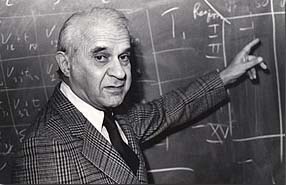A - B - C - D - E- F - G - H - I-J-K - L - M - N-O - P - Q - R - S - T-U - V-W - X-Y-Z
Leontief, Wassily ( 1906-1999 )
Premio Nobel  1973
1973
Leontief, Wassily nació en San Petersburgo. En 1931 emigró a los Estados Unidos, donde se nacionalizó. Obtuvo el Premio Nobel de Economía en 1973 por el desarrollo del método input-output y su aplicación a importantes problemas económicos.
 Estudió economía en las Universidades de Moscú y Leningrado. Se doctoró en la Universidad de Berlín en 1928 y trabajó en la Escuela de Kiel hasta su desmantelamiento por Hitler. En Estados Unidos trabajó en el National Bureau of Economic Research y fue profesor en Harvard.
Estudió economía en las Universidades de Moscú y Leningrado. Se doctoró en la Universidad de Berlín en 1928 y trabajó en la Escuela de Kiel hasta su desmantelamiento por Hitler. En Estados Unidos trabajó en el National Bureau of Economic Research y fue profesor en Harvard.
Las tablas input-output son la culminación de una larga tradición teórica que puede remontarse a los fisiócratas y Quesnay, con los desarrollos matemáticos de Walras. Leontief comenzó a desarrollar su modelo teórico ya en la Escuela de Kiel, pero no fue hasta 1941 que pudo publicar su "The Structure of the American Economy", libro en el que por primera vez se presentaba un trabajo empírico realizado con esa metodología.
El interés de los trabajos de Leontief no se limita a sus famosas TIO: Leontief fue un destacado keynesiano con gran influencia sobre los neo-keynesianos y los neo-ricardianos. En 1953 descubrió el hecho conocido como "la paradoja de Leontief": que las exportaciones de los Estados Unidos no son "capital intensivas" sino "trabajo intensivas", lo que contradecía la teoría clásica del comercio internacional.
Aquí puede leer una explicación sencilla sobre las tablas input-output.
Aquí puede leer el artículo en español de Leontief incluido en este sitio web o CD-ROM
Supuestos teóricos y hechos no observados
OBRAS
El análisis económico input-output (1966). Versión castellana Ed. G. Gili, Barcelona, 1970.
Ensayos sobre economía (1966). Versión castellana en Ed. Ariel, Barcelona, 1980.
El futuro de la economía mundial (1977) Versión castellana en Ed. Siglo XXI, Madrid, 1977.
"The Use of Indifference Curves in the Analysis of Foreign Trade", 1933, QJE.
"Delayed Adjustment of Supply and Partial Equilibrium", 1934, ZfN.
"The Fundamental Assumption of Mr. Keynes's Monetary Theory of Unemployment", 1936, QJE.
"Composite Commodities and the Problem of Index Numbers", 1936, Econometrica.
"Implicit Theorizing: a methodological criticism of the Neo-Cambridge school", 1937, QJE.
"The Significance of Marxian Economics for Present-Day Economic Theory", 1938, AER.
The Structure of the American Economy, 1919-1939, 1941.
"The Pure Theory of the Guaranteed Annual Wage Contract", 1946, JPE.
"Introduction to a Theory of the Internal Structure of Functional Relationships", 1947, Econometrica.
"Wages, Profits, Prices and Taxes", 1947, Dun's Review.
"Postulates: Keynes's General Theory and the classicists", 1947, in Harris, editor, The New Economics.
"Note on the Pluralistic Interpretation of History and the Problem of Interdisciplinary Co-operation", 1948, J of Philosophy.
"Input-Output Economics", 1951, Scientific American.
"Machines and Man", 1952, Scientific American.
Studies in the Structure of the American Economy, 1953.
"Domestic Production and Foreign Trade: the American capital position re-examined", 1953, Proceedings of American Philosophical Society.
"Mathematics in Economics", 1954, Bulletin of the AMS.
"Factor Proportions and the Structure of American Trade: Further theoretical and empirical analysis", 1956, REStat.
"Theoretical Note on the Time-Preference, Productivity of Capital, Stagnation and Economic Growth", 1958, AER.
"The Problem of Quality and Quantity in Economics", 1959, Daedalus.
"The Rise and Decline of Soviet Economic Science", 1960, Foreign Affairs.
"The Economic Effects of Disarmament", with M. Hoffenberg, 1961, Scientific American.
"The Rates of Long Run Growth and Capital Transfer from Developed to Underdeveloped Areas", 1963, Proceedings of Conference on Role of Econometric Analysis.
"Modern Techniques for Economic Planning and Projection", 1963, Scuola in Azione.
"Multiregional Input-Output Analysis", with A. Strout, 1963, in Barna, editor, Structural Intedependence...
"The Structure of Development", 1963, Scientific American.
"When Should History be written Backwards?", 1963, Economic History Review.
"Proposal for Better Economic Forecasting", 1964, Harvard Business Review.
"On Assignment of Patent Rights on Inventions Made under Government Research Contracts", 1964, Harvard Law Review.
"Input-Output Analysis", 1965, Scientific American.
Input-Output Economics, 1966.
Essays in Economics: Theories and theorizing, 1966.
Essays in Economics, 1966.
"Theoretical Assumptions and Non-Observed Facts", 1971, AER.
"Structure of World Production: Outline of a simple input-output formulation", 1974, AER
The Future of the World Economy, with A.P. Carter and P. Petri 1977.
Military Spending, with F. Duchin, 1983
The Future Impact of Automation on Workers, with F. Duchin, 1986.
"Money-Flow Computations", with A. Brody, 1993, Econ Systems Research